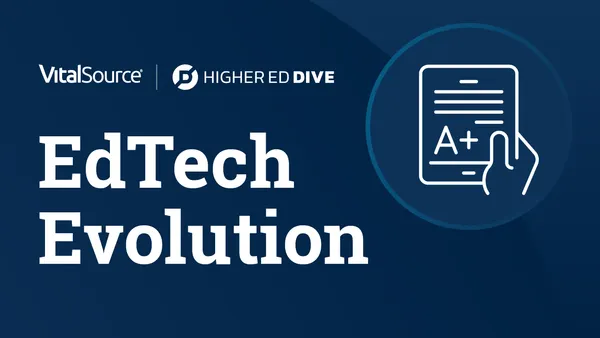With over 260 exhibitors on the floor at Educause 2014, there was plenty for attendees to see. Education Dive was on hand to take it all in, and while we didn't see everything, there was plenty that caught our attention.
From the latest LMS to publishing developments to lecture capture, and in no particular order, we put together the following list of things to note at this year's event.
1. Vocareum
A new learning management system on display this year, Vocareum is designed specifically for computer science classes. Its platform can be configured for high school advanced placement, college and university, or MOOC use. The platform's key feature is an in-browser coding workbench, which allows TA and peer review via insertable comments on a student's code.
2. Flat World
While you're perhaps more familiar with the company's e-book publishing arm, the company also has solutions for competency-based education. We spoke with the company's president, James Rainhard, and senior managing director of business development, Patrick Garayta, who told us that the company's work on digital textbooks really helped to drive the company's evolution with its adaptive learning, analytics, and competency based tools. Among the clients for its competency-based platform is Brandman University, which is using it to offer an $11,000 business bachelor's degree.
3. Collaaj
In the exhibit hall's "startup alley," Collaaj had its lecture capture platform on display. The platform allows teachers to create tutorial videos centered around class topics and publish them on a custom-branded channel. The company also has a whiteboard app available for students, allowing them to create videos with slides and drawings that can then be shared with their peers via a secure URL.
4. Canvas
Going into Educause, Instructure's Canvas made waves with the announcement of Canvas Commons, a new platform integrated into its LMS that facilitates the crowdsourcing and social sharing of educational content. The company had another ace up its sleeve, however, with the revelation that its Canvas Grants, first announced at last year's show, would return. This year's $100,000 in grants will be centered around lossless learning, or "the pursuit of perfect feedback loops between learners and educators," and will be available to both higher ed and K-12.
"We've built Canvas to be an open platform so that technologists can develop interesting things on top of Canvas that are nicely integrated," said VP of Research & Education Jared Stein. "But now we want to say, 'Now let's invest some resources to help teachers and instructional designers and technologists develop things that are innovative, that perhaps they didn't have resources to work on before."
5. Kaltura
Kaltura didn't start out in education. Founded in 2006 by a group of entrepreneurs who wanted to build private, secure video collaboration tools for enterprise and media companies — HBO, TMZ, and Eli Lilly are among its clients. In 2009, however, the company began seeing interest from educators who were teaching online courses. VP of Education Justin Beck told us that, as a result, Kaltura set out to provide an easy way to manage video content for faculty, easy tools for instructional designers to build that content, and an accessible, mobile-friendly platform where students could find everything.
It started by integrating with all of the major LMSes — Blackboard, D2L, Moodle, Canvas, Sakai, etc. — but it now also offers a personal creativity suite, the cornerstone of which is called CaptureSpace, an easy-to-use lecture capture solution. It can be used within the LMS or separately. Additionally, institutions and K-12 consortiums can utilize MediaSpace, which is essentially a brandable "YouTube in a box." Kaltura has also partnered with 10 institutions, including the Universities of Illinois and Missouri, to assemble an accessibility advisory board to improve the quality of its offerings.
6. Blackboard
While attendees got a preview of what Blackboard had in store prior to the conference with the announcement of its acquisition of Requestec, there was more on the agenda for the LMS provider than its new WebRTC video collaboration tools. Perhaps the biggest announcement: The company is releasing a cloud-based version of Blackboard Learn, which, among other things, will allow the company to issue new features and automatic updates with no service interruptions and less change management on the part of institutions. On-site hosting options will remain available, as well.
"We understand there's a choice around that, but for people at especially small schools, they don't have the budget, they don't have the expertise, and they don't have the experience to do it well," said VP of Product Management Annie Chechitelli. "Then we came in like, 'Here, let's drive in our Escalade of hosting options with all the features and everything in it,' and that seemed a little big for what they were trying to do, as well. It's nice to be able to meet the market to provide a more appropriate response."
Additionally, Unizin is piloting the Blackboard xpLor platform among the other open content repositories it's considering, and a new integration partnership with Lynda.com will bring that company's video lessons to Blackboard's library of resources.
7. Pearson
Education publishing giant Pearson started out the week with the launch of REVEL, a new platform available across desktop and mobile that answers the "passive, laborious" textbooks with an engaging combination of text, interactive exercises, infographics, social features, and videos. Over 23,000 students and educators offered feedback during REVEL's creation, and it should also be noted that the platform won't replace other platforms like the MyLab and Mastering products.
Pearson executives John Tweeddale, Kendrick McLish, and Stephen Frail were all on hand to give us a demo of REVEL. Among the findings in the research were that attempts to make learning "fun" tended to create further distraction, so REVEL presents a relatively clean page on the screen. Among the first things students see when logging on is what they need to do and learn in each assignment, all of which are arranged by date, helping to keep them on track. Throughout the assignment, students have the opportunity to participate in assessments and other interactive exercises that test what they've just learned. Accessibility features for students with learning or vision disabilities are also included. Instructors are able to create assignments and also track analytics on a performance dashboard.
"One of the biggest problems REVEL solves is what we call 'the reading problem,' why students come to class and have not read the book — they're not prepared for the learning to take place in class, the interactions, discussions," said Frail, director of digital product management. "The performance dashboard gives instructors a view into what their student has done in that assignment."
8. Difference Engine
Difference Engine is a division of Learning Objects, Inc., and the startup offers a number of mobile-first, cloud-based, modular solutions designed to integrate with several platforms for partners that include publishers, colleges and universities, and for-profit education companies. "We've been kind of incubating it in quiet for a couple of years now and we're ready to start talking about it," says Chief Operating Officer Allison Phillips, who describes the platform as "the operating system for learning," adding that the company has "created a platform that's learner-centric, competency-based, and above-the-course, but in a way that's flexible, unlike a lot of the off-the-shelf stuff." Among those solutions: An adaptive assessments engine, an e-book with numerous learning activities, a personal learning planning tool with a prior learning assessment that helps students map how to get from Point A to Point B. The products can be offered individually or together.
Along with competency-based learning, gamification has been a particularly big deal for Difference Engine, and the company recently hosted the White House and Department of Education's 48-hour educational gaming hackathon in its Washington, DC, office.
9. Polycom
Another video tech provider on display, Polycom enables institutions to provide high-quality video in distance learning and collaborative conferencing. Like other providers, it also offers a video management solution that essentially lets institutions create their own "YouTube." There was definitely a noticeable lecture capture tech trend on the show floor this year, and the Polycom's global director of education and training, Marci Powell, told us that aside from recording a lecture or facilitating a video conference, an institution might utilize it to record a guest speaker who might not be able to come to the institution to speak with students every semester.
10. D2L
A lot has changed with D2L, formerly known as Desire2Learn, in the last year. Aside from the shortening of the company's name, its flagship LMS also got a rebrand as Brightspace and an increased focus on personalized learning. "It certainly seems to be resonating — everything from our new gaming stuff that we're working on to our adaptive learning to our student success efforts," said President John Baker. "All of those things are generating a lot of excitement with both existing clients, obviously, but with new prospects as well."
Baker says the company always strived toward personalized learning in its offerings, but now it has reorganized its team to work on various tasks across its entire line of products. So far, the efforts are paying off: The University System of Georgia won a NASCIO IT Award for its Brightspace implementation due to increased graduation rates. Additionally, the company is offering a Web accessibility MOOC with Portland Community College.
11. Modo Labs
Modo Labs provides mobile-first portal solutions for campuses — or, to put it simply, they help colleges and universities create branded, open-source mobile apps and Web sites using its Korogo Mobile Campus solution. Modules on the apps serve purposes ranging from letting students drag and drop classes to navigating the campus, and different versions can be created for student, faculty, or parent users.
A key point: There's no coding knowledge required on the client's part. "We run the spectrum on users. For the most part, the ease of use can be applied generally to a non-developer and build these fairly sophisticated applications," says CEO Stewart Elliot. "But it turns out that we also provide our customers programmable source code, so if you do have programmers on staff, you can also extend it at the source code level. And this can be important, because maybe I made a proprietary module, which is specific for a particular type of use case. And you can create that module quite easily in our product."
But just to stress the idea that coding knowledge isn't necessary at all, Elliot points out the Harvard "Shoestring Strategies" app, developed entirely by students without coding experience. All things considered, it's a great option, especially if your institution lacks programming staff or resources.
Would you like to see more education news like this in your inbox on a daily basis? Subscribe to our Education Dive email newsletter! You may also want to read the rest of Education Dive's coverage of Educause 2014, collected here in one convenient location.












